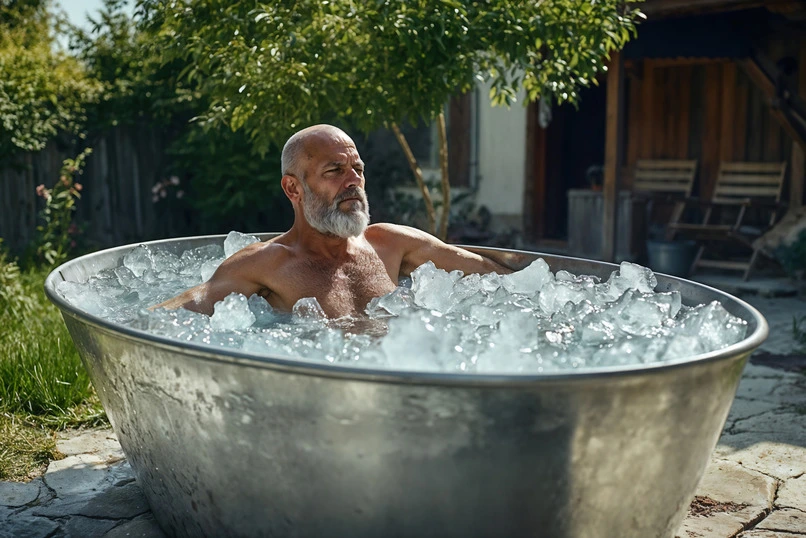In recent years, cold showers have surged in popularity, especially among wellness enthusiasts and athletes. Several well-known figures, including Wim Hof, also known as “The Iceman,” and Tony Robbins, the motivational speaker and life coach, have publicly vouched for the benefits of cold exposure. Joe Rogan, the popular podcast host, and Tim Ferriss, author of The 4-Hour Workweek, also advocate for cold showers as a way to boost mental and physical resilience. Even actress and wellness entrepreneur Gwyneth Paltrow incorporates cold showers into her routine for holistic health.
The practice of cold water therapy isn’t new; it has been used for centuries. The ancient Greeks and Romans were known to take cold baths to invigorate both body and mind. Today, scientific research has validated many of these benefits, with studies showing that regular cold exposure can boost endorphin levels, improve circulation, and enhance overall well-being.
While cold showers may sound daunting, their health benefits might just surprise you. From boosting energy levels to reducing stress, this simple practice can have profound effects on both your physical and mental well-being.
Important Note: While I recommend trying all the other tips mentioned in this series—How to Overcome Difficult Times in Life—cold showers may not be suitable for everyone. If you have a heart condition or any medical issue where sudden physical shock is discouraged, please consult a doctor before trying this practice.
My Cold Shower Journey: A Game-Changer in Times of Crisis
I discovered the benefits of cold showers over four years ago during the COVID lockdown, and it was a game-changer for me. At that time, my life was in shambles: I had just left my company without a backup plan, was under investigation for tax evasion, went through a breakup, and felt like everything was collapsing. The weight of these challenges took a significant mental toll, leaving me trapped in a cycle of sadness, loneliness, stress, and depression.
One morning, feeling completely trapped and desperate for relief, I looked around my apartment for a distraction. That’s when I noticed water dripping from the shower and had a sudden inspiration—why not take a freezing cold shower to shock myself out of this state?
I immediately turned the water temperature down to the coldest setting and jumped in, immersing myself from head to toe. The shock was intense, but it was incredibly relieving. In that moment, I forgot everything except the instinct to survive. My brain and every cell in my body rallied together to combat the icy water. My heart raced, and my body shivered. It was terrifying yet exhilarating. For those ten minutes, I felt truly alive. The shock seemed to hit a reset button in my brain, and I no longer felt heartbroken, miserable, or distressed.
That feeling lasted nearly an entire day. For the first time in weeks, I saw my happy self again and perceived things around me without the usual gloom. Needless to say, cold showers have since become part of my daily routine, and I’m hooked.
How to Incorporate Cold Showers into Your Routine
- Start Gradually: Begin with lukewarm water and slowly decrease the temperature over time. This helps your body adjust to the cold.
- Set a Timer: Start with 30 seconds of cold water and gradually increase the duration as you become more comfortable.
- Breathing Techniques: Practice deep breathing to help manage the shock and discomfort of the cold water. This can help with relaxation and enhance the benefits.
The Science Behind Cold Showers
What I experienced wasn’t just a placebo effect—there’s real science behind the benefits of cold showers:
1. Boosts Mood and Energy Levels: Cold showers can stimulate the production of endorphins, the body’s natural “feel-good” hormones. Research suggests that cold exposure triggers a significant release of norepinephrine, a neurotransmitter essential for mood regulation and alertness. For instance, a study published in Medical Hypotheses shows that cold exposure can lead to an improvement in mood and energy levels. This is why many people, including myself, feel an immediate uplift in spirits and a surge of energy after a cold shower. Cold showers can also combat symptoms of depression by promoting a sense of well-being.
2. Reduces Stress and Anxiety: Cold showers activate the sympathetic nervous system, increasing endorphins and oxygen levels in the body, which helps reduce stress. Regular cold exposure has been linked to lower cortisol levels, the hormone associated with stress. For example, a study in PLOS ONE found that cold exposure could reduce anxiety symptoms. This might explain why I felt a notable reduction in stress and anxiety after making cold showers a daily habit. Moreover, cold showers may help with anxiety by improving parasympathetic nervous system activity, which helps calm the body down.
3. Improves Circulation: The shock of cold water causes your blood vessels to constrict, leading to improved circulation. This process, known as vasoconstriction, forces blood to flow more efficiently through your body, delivering oxygen and nutrients more effectively to your tissues. Improved circulation contributes to better cardiovascular health and overall well-being, especially during stressful times. The benefits of improved circulation from cold water therapy are well-documented, particularly for cardiovascular health.
4. Enhances Immune Function: Some studies suggest that cold showers may boost the immune system. For example, a Dutch study found that people who took cold showers for 30 seconds each morning were 29% less likely to call in sick for work than those who took warm showers. This immune-boosting effect can be a valuable tool for staying healthy, particularly when stress levels are high. Regular cold exposure can also increase white blood cell count, which plays a crucial role in fighting infections.
5. Builds Mental Resilience: Regular exposure to cold stress through cold showers can build mental resilience. By enduring the discomfort of cold water, you train your mind to handle other stressful situations more effectively. This mental toughness can carry over into other areas of life, helping you navigate challenges with greater ease. To start building this resilience, you can begin with a lukewarm shower and gradually lower the temperature over time.
Safety Considerations
Before jumping into a cold shower, it’s important to consider your health. Individuals with certain cardiovascular conditions or cold intolerance should avoid cold showers or consult with a healthcare professional before trying this practice. The sudden shock of cold water can be intense, so it’s crucial to start slow, especially if you’re new to the practice.
FAQs about Cold Showers:
- Is it Safe for Everyone? People with cardiovascular issues or cold intolerance should consult a healthcare professional before starting cold showers.
- What If I Don’t Like the Cold? If the cold is too uncomfortable, try starting with a warm shower and gradually reducing the temperature. Breathing techniques can also help manage discomfort.
Practical Tips for Success
- Monitor Your Progress: Keep a journal of your experiences with cold showers, noting any changes in mood, energy levels, or stress.
- Stay Consistent: Aim to incorporate cold showers into your routine consistently to experience the full range of benefits.
Conclusion
Cold showers offer a powerful way to reset both your body and mind, delivering immediate and invigorating benefits. From boosting your mood and energy to building mental resilience, the effects can be transformative. Ready to invigorate your mornings and boost your health? Start by adding a 30-second cold blast to the end of your shower and feel the difference for yourself!
Try it out and let me know how it goes in the comments below!
***This chapter is part of an eight-chapter series titled “How to Overcome Difficult Times in Life: Tips, Strategies, and Personal Advice.”
Don’t miss any part of the series! Stay updated and explore the full collection of chapters here:
- Introduction: How To Overcome Difficult Times In Life: Tips, Strategies, And Personal Advice
- Part 1: How to Use Journaling to Clear Your Mind and Boost Emotional Well-Being
- Part 2: How a 30-60 Minute Walk in Nature Can Enhance Your Mental and Physical Health
- Part 3: How to Practice Positive Self-Talk for Better Mental Health
- Part 4: How to Set Small Goals and Achievable Tasks for Success
- Part 5: The Power of Self-Love: Proven Practices for Mental Health and Fulfillment
- Part 6: Why Talking to Family and Close Friends is Crucial for Emotional Support
- Part 7: The Benefits of Practicing Meditation: How to Get Started
- Part 8: The Surprising Health Benefits of Cold Showers: Boost Energy, Reduce Stress, and Build Mental Resilience
Related posts:
 How to Overcome Difficult Times in Life: Tips, Strategies, and Personal Advice
How to Overcome Difficult Times in Life: Tips, Strategies, and Personal Advice
 How to Set Small Goals and Achievable Tasks for Success
How to Set Small Goals and Achievable Tasks for Success
 The Power of Self-Love: Proven Practices for Mental Health and Fulfillment
The Power of Self-Love: Proven Practices for Mental Health and Fulfillment
 Why Talking to Family and Close Friends is Crucial for Emotional Support: A Cross-Cultural Perspective
Why Talking to Family and Close Friends is Crucial for Emotional Support: A Cross-Cultural Perspective
 How to Stop Feeling Rushed and Anxious: Proven Strategies to Overcome Rush Syndrome
How to Stop Feeling Rushed and Anxious: Proven Strategies to Overcome Rush Syndrome
 Not Every Day is a Win—But Every Day is a Lesson
Not Every Day is a Win—But Every Day is a Lesson

